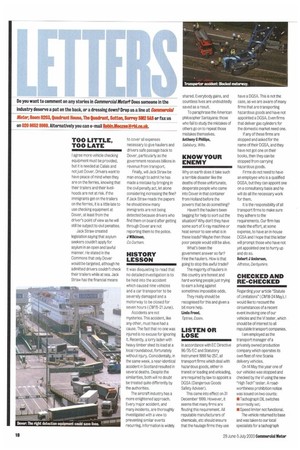LISTEN OR LOSE
Page 20

If you've noticed an error in this article please click here to report it so we can fix it.
In accordance with EC Directive 96/35/EC and Statutory Instrument 1999 No 257, all transport firms which deal with hazardous goads, either in transit or loading and unloading, are required by law to appoint a DGSA (Dangerous Goods Safety Adviser).
This came into effect on 31 December 1999. However, it seems that many firms are flouting this requirement. All reputable manufacturers of chemicals, etc should ensure that the haulage firms they use have a DGSA. This is not the case, as we are aware of many firms that are transporting hazardous goods and have not appointed a DGSA. Even firms that deliver gas cylinders for the domestic market need one.
If any of these firms are stopped and asked for the name of their DGSA, and they have not got one on their books, then they can be stopped from carrying hazardous goods.
Firms do not need to have an employee who is a qualified DGSA, but they can appoint one on a consultancy basis and he will do all the necessary work for them.
It is the responsibility of all transport firms to make sure they adhere to the requirements. Our firm has made the effort, at some expense, to have an in-house DGSA and I hope that this letter will prompt those who have not yet appointed one to hurry up and do so.
Robert J Anderson, Alfreton, Derbyshire.












































































































